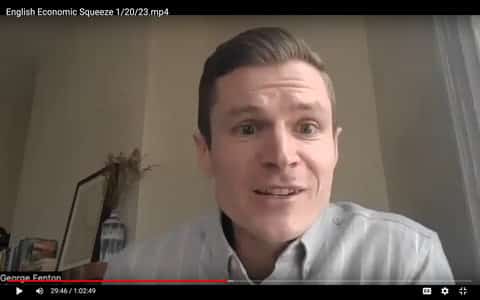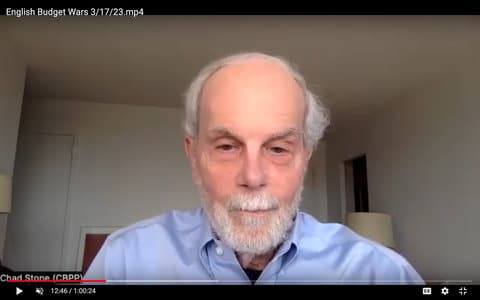
18 Feb Economic Downturn Threatens to Bring Down Marginalized People

George Fenton of the Center on Budget Policy and Priorities said it was “maddening” and “tragic” that the Child Tax Credit expansion had been allowed to expire. (Screenshot captured by Danielle Parenteau-Decker / The CC Pulse)
By Danielle Parenteau-Decker
The U.S. labor market is on a hot streak. Hundreds of thousands of jobs are being created each month. Great news, right? Not quite, says a panel of economic experts.
The panelists shared their perspective on the state of the economy now and for the year to come in a Jan. 20 Ethnic Media Services news briefing that asked the question “How Tight Will the Economic Squeeze Get in 2023?”
“You don’t have a recession when you have 500,000 jobs and the lowest unemployment rate in more than 50 years,” Treasury Secretary Janet Yellen said Feb. 6 on “Good Morning America,” referring to the 517,000 new jobs added in December and the 3.4% unemployment rate.
But the panelists were not so sure.
“We really do not know if there will be a recession,” said George Fenton, a senior policy analyst for the Center on Budget Policy and Priorities.
“Something’s got to give,” said Wendy Edelberg, director of the Hamilton Project and former chief economist of the Congressional Budget Office. She called the job market “unsustainably strong.”
“A net gain of 225,000 jobs every month? Our economy cannot sustain that,” she said. “I’m not saying unemployment has to surge at all, but unemployment probably cannot stay where it is forevermore.”
And when the labor market does come down, Black men are particularly likely to suffer the consequences.
“The second the labor market turns and gets softer, Black prime-age men are the first and hardest to be hit, generally speaking,” Edelberg said. “And they’re the ones to very quickly see their unemployment rates rise and rise much faster and to much higher levels than white prime-age men.” (Prime age in labor is considered to be 25 to 54 years of age.)
“A softening in the economy is going to hurt marginalized people hardest and fastest,” she added.
Rakeen Mabud, chief economist of the Groundwork Collaborative, said it is important to not only keep unemployment low but to provide high-quality jobs, investment in infrastructure and sick leave.
Last year, inflation surged, and the Federal Reserve responded by raising interest rates — “its one basic, main tool when it comes to inflation,” Mabud said.
Pushing rates up is likely to bring the job market down, she said.
The rate hikes raise “the cost of borrowing, which has the effect of depressing unemployment,” Mabud said. “You’re going to see businesses start to lay people off or fire people.”
She said it is important to remember what is at stake.
“These are real lives we’re talking about,” she said. “These are real people’s jobs. These are real people struggling to put food on the table.”
Mabud also said the interest rate hikes don’t address the underlying causes driving higher prices.
“The reason why we have higher inflation today is not because people have too much money in their pockets or because they’re spending too much,” she said. “The reason we have inflation is because we have a system that was built by and for big corporations that has utterly failed to meet the needs of people in a moment of crisis.”
>>>Read: Corporations Are Using Inflation to Pad Profits, Economist Says
She said Groundwork had listened in to hundreds of earning calls from corporations to their investors. What it “heard over and over again” was that “raising prices on consumers has been really, really good for business and hiding behind the curtain of inflation, the smokescreen of inflation has been a very effective strategy.”
Mabud called for an economy that puts people first.
“You cannot have a healthy economy unless the people who keep our economy going — workers, families, consumers … unless all of us are doing well,” she said.
Fenton said measures that were taken to help people weather economic troubles earlier in the pandemic — such as the expansion of the Child Tax Credit and unemployment insurance protections — need to be brought back.
The tax credit was temporarily changed to make more families eligible and to provide direct payments. That expansion helped drive child poverty to a historic low.
“It’s astounding, if you think about it,” Fenton said. “During that crisis, not only did child poverty not increase, but it was driven all the way down to about 5% lower than it has ever been in the United States.”
>>>Read: The Expanded Child Tax Credit Gave Poor Families a Boost, But It Didn’t Last
Then the expansion expired in December 2021. “Immediately and unsurprisingly, we saw millions of kids who were thrown back into poverty,” he said. “It’s kind of maddening; it’s tragic that this policy has expired.”
The way the credit normally works, it doesn’t help the children and families who could need it most.
Fenton said that without the expansion, there are some families with children who cannot get the credit because they “are deemed too poor.”
“Low-income families lose out because they do not have enough earnings to qualify for the full benefit,” said the Columbia University Center for Poverty and Social Policy in 2019. “Those left out are disproportionately children of color, those in families with young children, those with single parents, and those who reside in rural areas.
“This sounds upside-down,” Fenton said, “because it is.”
Mabud and Edelberg suggested the government could be doing a lot more.
“There is a very significant role for fiscal policy … to absolutely help people who are in financially fragile situations,” Edelberg said. “And then there is a harder and more significant role for policymakers to actually just make families in the United States more financially resilient and stronger so that they’re just on better footing and they have better long-term experiences in the labor market.”





No Comments